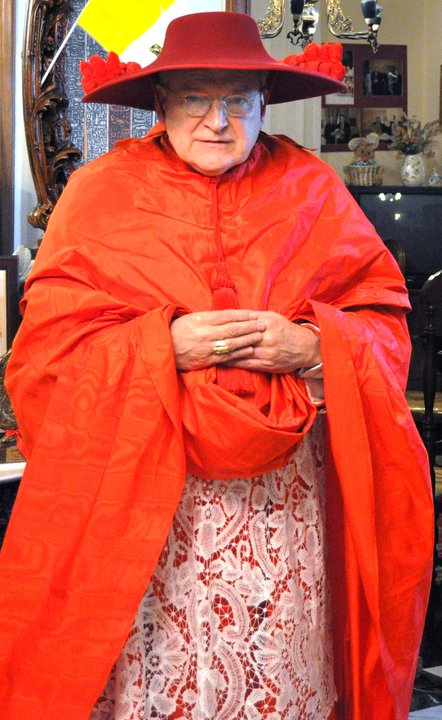I was interested to read this piece on Zenit:
VATICAN CITY, JAN. 10, 2012 (Zenit.org).- When those to be made cardinals gather for the consistory on Feb. 18, the ceremony will be different than it has been in recent decades.
The Vatican announced that there will be a number of changes in the rite, which was last modified in the post-Vatican II changes to the liturgy.
Pope Benedict XVI confers the red biretta on Archbishop Dziwisz of Cracow
Image: 30giorni.it
According to the Office of Liturgical Celebrations of the Supreme Pontiff the rite will be simpler, in part to avoid the impression that the ceremony of creating cardinals has any kind of sacramental meaning.
Instead of having the consistory and then the following day a Mass celebrated by the Pope in which he consigns a ring to each new cardinal, there will be just one ceremony in which the traditional three elements -- the imposition of the biretta, the consignment of the ring and the assignation of their titular churches -- will take place.
As well, both the collect and the concluding prayer have been modified, returning to the texts used prior to Vatican II: The two prayers speak of the powers the Lord gave to the Church, in particular that of Peter. The Pope also prays directly for himself, that he may carry out his duties well.
Insofar as the Scripture texts used, there will only be a Gospel reading, omitting the first reading. The Gospel text used will be that of Mark 10: 32-45, in which Jesus announces his death and subsequent resurrection to the disciples and also tells them they must not seek to dominate others, but to be servants to all.
The following day the new cardinals will still concelebrate Mass with the Pope.
This appears to be a conservative reform in that it makes the nature of the elevation clear, and the return to the previous Collects is consistent with a return to a traditional understanding of the event and the Papal and cardinalate ministry. This would appear welcome, and very much in the mainstream of the Benedictine reforms.
What would be more welcome still would be a return to the full traditional ceremonial and the full attributes of the dignity of a Cardinal of the Holy Roman Church. So not just the red biretta, first given by Pope Paul II (1464-71) - and hence its earlier form than that of lesser ranking clergy - but also of the more ancient galero, and instead of its use merely in heraldry and on notepaper, but its official reception and use at the proper times.
Not that some Cardinals at least do not acquire the symbols of their rank:

Cardinal Burke - a recent photograph
Image: Renegade Trad blog
Image: Renegade Trad blog
In All Hats Are Silly , which has some rather fine illustrations, the author from Renegade Trad makes good points about the haphazard way in which senior figures wear one item and not another. Like the author, if I read him or her aright, I would be a wholehearted favourer of tradional usage - if you are going to do something, do it properly.
Bring back the galero - now!


No comments:
Post a Comment